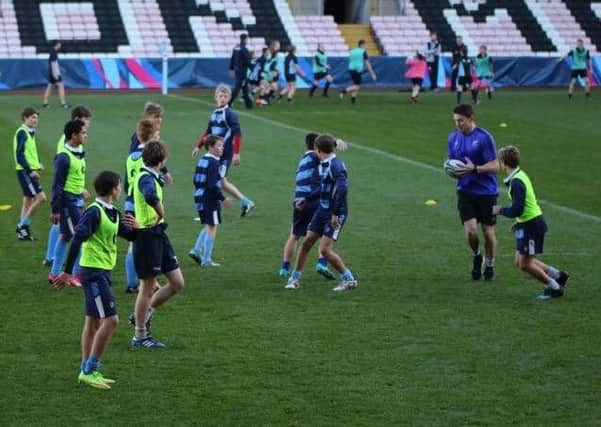Cultural beacons should do more for northern children


Anne Longfield said children in entrenched deprived areas often have ambitions in arts and sport which they have to abandon at the age of 15 or 16 as they find there is nowhere they can take talent.
Big northern presences like the Tate in Liverpool or football clubs should therefore reach out to give children a sense of possibility.
Advertisement
Hide AdAdvertisement
Hide AdMs Longfield spoke as she launched a major report on the 3.6m children growing up in the North, which found a North-South divide that has existed for generations.
Children in London are advantaged because they are surrounded by national institutions, she said.
While school is important, arts and sport can help children become more confident, independent, build self esteem and eventually even get jobs.
Ms Longfield said she would like to see the North’s cultural beacons taking a more hands on role across the region.
Advertisement
Hide AdAdvertisement
Hide AdShe told The Yorkshire Post: “You’ve got the Tate in Liverpool, you’ve got the National Museum of TV and Media up in Bradford, well actually wouldn’t it be great if part of their mission was actually to emanate from those national headquarters and not just work with disadvantaged communities in their area but actually take a leadership role across the whole or the North to bring together arts organisations or bring together sports organisations, to really reach out and give children that sense that this is possible, this could be here for them, support schools, all of those kind of things.”
Such a move could improve opportunity for youngsters across the North.
“Just as you have to do with transport, you have to build the kind of tubes, the connections for people to get to work - in a way what you’ve got to do is build the connections and the tubes for children in some of the most entrenched disadvantaged communities to get to the places where sport, arts, activities, and ultimately jobs are,” Ms Longfield said.
“So you’ve got to build those connections and what you see with disadvantaged communities is that they are isolated, they don’t have great self belief, often there aren’t the opportunities there within the community and role models often for children to see that these jobs are there for them.
Advertisement
Hide AdAdvertisement
Hide Ad“So they might have ambitions and aspirations which they nearly always do have, but actually they have to make compromises often when it gets to 15-16 because there just aren’t places they can take them in their communities, and that’s what I want to change.”
In her report, Ms Longfield also calls for a “far more concerted effort” to improve the North’s secondary schools in deprived areas with a focus on teaching recruitment and leadership.
Every single local area should also produce a plan to ensure children are in apprenticeship, training or education until they are 18.
“Growing Up North forums” should be created to bring together all the bodies working with children from local authorities, schools, employers, health bodies, the voluntary sector and the police.
Advertisement
Hide AdAdvertisement
Hide AdAnd families with young children who are struggling should be given help to close the North’s worse performance for early years, with “substantial” innovation grants from the Treasury to develop more effective early support.
Ultimately, devolution presents an opportunity for change, Ms Longfield said.
“There’s a real feeling across the North that things are possible.
“And for all the criticisms about what the northern powerhouse focuses on, or what geographical spread it has, all of those things, it brings and excitement and a momentum about it that is really tangible.
Advertisement
Hide AdAdvertisement
Hide Ad“And when I set out on this project I wanted to see whether it was possible if you like to take that momentum and really build into it the futures for children and the kind of support children need.
“I think having looked at it, seen the things that work, talk to children who are really ambitious and wanted something different, and then looking at the kind of people who are ready and waiting to go, which I think they are, it is possible.
“But it needs backing, it needs focus, and it needs Whitehall to have the will and investment to make it happen.”